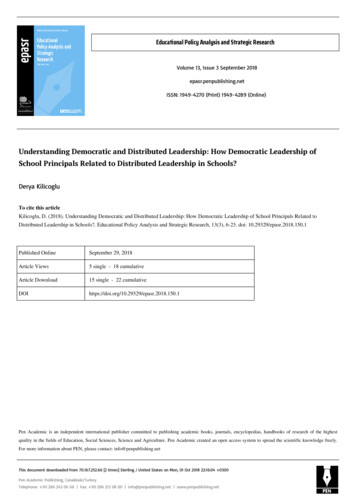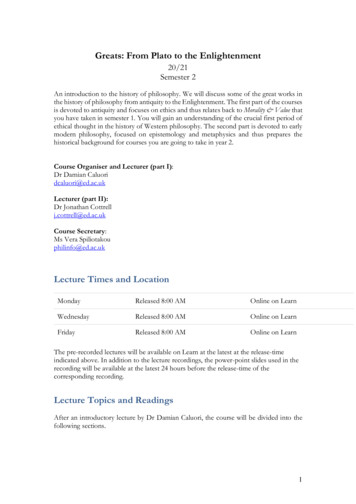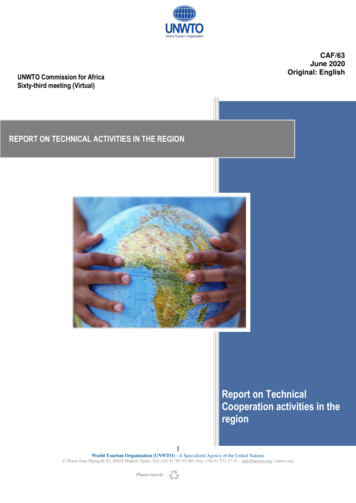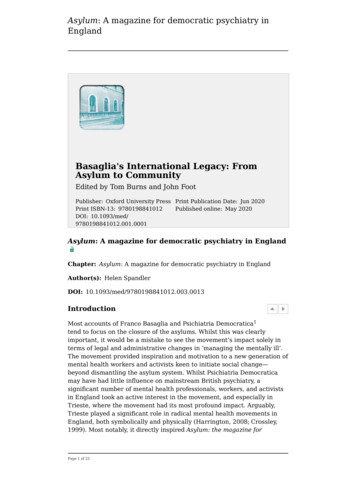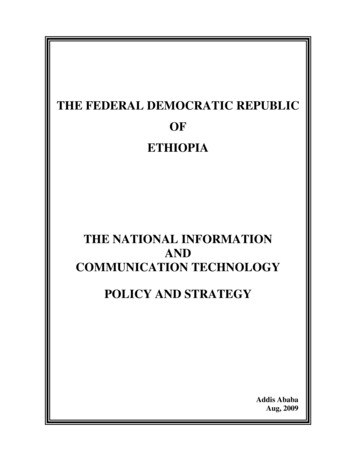
Transcription
THE FEDERAL DEMOCRATIC REPUBLICOFETHIOPIATHE NATIONAL INFORMATIONANDCOMMUNICATION TECHNOLOGYPOLICY AND STRATEGYAddis AbabaAug, 2009
Table of contentsPagesWORKING DEFINITIONS . iABBREVIATIONS AND ACRONYMS . iiiCHAPTER ONE . 11. INTRODUCTION . 1CHAPTER TWO . 32. VISION, MISSION, GOAL, OBJECTIVES AND PRINCIPLES . 32.1 The National Vision . 32.2 The ICT Vision . 32.3 Mission. 32.4 Goal . 32.5 The Broad Objectives . 32.6 Principles. 4CHAPTER THREE . 53. THE STRATEGIC FOCUS OF ICT POLICY . 53.1. Introduction . 53.2. ICT Infrastructure . 53.2.1. Overview . 53.2.2. Goal . 63.2.3. Objectives . 63.2.4. Strategies . 63.3. HUMAN RESOURCE DEVELOPMENT . 73.3.1. Overview . 73.3.2. Goal . 73.3.4. Strategies . 73.4. ICT’s Legal Systems and Security. 83.4.1. Overview . 83.4.2. Goal . 93.4.3. Objectives and Strategies . 93.5. ICT FOR GOVERNMENT ADMINISTRATION AND SERVICES(EGOVERNMENT) . 123.5.1. Overview . 123.5.2. Goal . 133.5.3. Objectives . 133.5.4. Strategies . 133.5.5. ICT for the Education Sector . 143.5.6 ICT for Improved Health Service . 163.5.7 ICT for Modern Agricultural Sector . 183.5.7.1 Overview . 183.6. ICT Industry and the Private Sector Development . 19
3.6.1. Overview . 193.6.2. Goal . 193.6.3. Objectives . 203.6.4. Strategies . 203.7. Research and Technology Transfer . 213.7.1. Overview . 213.7.2. Goal . 213.7.3. Objectives . 213.7.4. Strategies . 22CHAPTER FOUR . 234. A FRAMEWORK FOR POLICY IMPLEMENTATION . 234.1 Overview . 234.2. Institutional Structure /Arrangement/ . 244.3. Monitoring and Evaluation . 254.4. The Way Forward: National ICT Mater Plan . 26
WORKING DEFINITIONSAgri- Net-A network of agricultural research centers across the countryproviding IT based video conferencing services, Internet, etc.Broad casting -The distribution of information using radio, television, Internet,intranets, and other technologies used in mass communication.Digital divide -The technological gap between countries or regions that havefully exploited ICT and those that have not.Electronic commerce - Business activities involving consumers, manufacturers,(E-Commerce)suppliers, services providers and intermediaries using computernetworks such as the Internet to conducts business.Electronic government - Refers to the delivery by Government of services, through the(E-Government)use of information and communication technologies action overnment to Business and Govern to Government.Information Based -A country or region where ICT has turned to be the bases of theEconomyeconomic foundation.Information society - A society where information and communication technology hasbeen fully exploited and is part of everyday life.Information andCommunication-The convergence of technologies and information services intelecommunications, information technology, and broadcasting.TechnologyICT Parks-A high ICT industrial zone specially designed to attract local andforeign direct investment.i
Incubator projects -ICT projects designed as start-up ventures with the hope of“growing” from a start-up to a self sustaining organization, afterinitial capital outlay and possible management consultancy.Information-TechnologyEmbraces the use of computers and office systems technologies forthe collection, processing, storing, packaging and dissemination ofinformation.Internet-A seamless and global network computer systems providingservices.Knowledge-Based EconomyA country or region where ICT is extensively used and the.foundation of the economic development is the knowledge ofsociety.School-Net -A network of high schools all over the country providing distanceeducation services (broadcasting classroom content, Internet, etc.)Unicode-An industry standard allowing computers to consistently representand manipulate text expressed in any of the world’s writingsystems.Woreda –Net -A three-tier architecture based government network for use atFederal, Regional, and Woreda levels to provide basic IP services(Web service, VOIP (voice over IP), Directory Service, Messagingand Video Conferencing.ii
ABBREVIATIONS AND ACRONYMSEICTDAThe Ethiopian Information and Communication Technology DevelopmentAgency.ETAThe Ethiopian Telecommunication Agency.ETCThe Ethiopian Telecommunication Corporation.ICTInformation and Communication TechnologyNICTCNational Information and Communication Technology Council.iii
CHAPTER ONE1.INTRODUCTIONThe Ethiopian Government has made the development of Information andcommunications technology one of its strategic plan priorities. ICT in Ethiopia atpresent is at the early stage of development. The major indicators pointing to the lowlevel of ICT Development are:a) The absence of appropriate legal and regulatory frameworks.b) Limitations in telecommunications infrastructure and low level of internetservices penetration.c) Lack of organized data and information resources, and poor accessibility to thosethat exist.d) Lack of skilled human resources coupled with low ICT literacy.e) Under developed private sector.These constraints present the Government with real challenges, but also opportunities,for all accelerated development of ICT in Ethiopia. Thus, the Government of Ethiopiarecognizing the importance of Information and Communication Technologydevelopment has adopted this ICT policy and strategy.The scope of Ethiopia’s ICT policy covers knowledge and information as a tool fordevelopment & ICT as a sector or industry. A part from being as enabler of socioeconomic development, ICT also supports Ethiopia’s on-going process ofdemocratization and good governance. The major areas of ICT application in the areaof democratic governance include on-going programs such as civil service reform,justice reform and decentralization. ICT promotes democratic governance by enabling1
all citizens to participate in the political process as well as have access to globalknowledge and information. Thus, the goal of the government is to ensure that allcitizens have equal and equitable access to government services and to knowledgeand information. Hence, the Government has a commitment to accelerate thedevelopment of ICT in order to strengthen the on-going process of sustainabledevelopment and poverty reduction as well as good governance and democraticsystem. This document articulates policy guidelines and describes critical strategicissues for the development of ICT in Ethiopia.The document is organized into 4 chapters. The first chapter highlights the status ofICT development in Ethiopia and also expresses the Government’s keen interest inthe exploitation and application of ICT. Chapter two explains the basic principles ofthe national ICT policy, in terms of ICT vision, mission, goals, objectives andstrategies. The third chapter explains the strategic focus of the policy in terms of thehuman resource development, ICT infrastructure establishment, governmentadministration and service delivery etc. The final chapter contains the creation ofinstitutional framework, and the coordination, monitoring and evaluation of the worksto be implemented.2
CHAPTER TWO2. VISION, MISSION, GOAL, OBJECTIVES AND PRINCIPLES2.1 The National VisionTo transform Ethiopia from a country associated with poverty to a middle- incomeeconomy and society with deep-rooted participatory democracy and good governancebased on the mutual aspirations of its peoples.2.2 The ICT VisionEvery aspect of Ethiopian life is ICT assisted.2.3 MissionTo develop, deploy and use information and communication technology to improvethe livelihood of every Ethiopian, and optimize its contribution to the development ofthe country.2.4 GoalTo vigorously promote the ICT sector and enhance its contribution in political, socialand economic transformation to make the country beneficial from the rapiddevelopment and progress.2.5 The Broad ObjectivesThe objectives of the ICT policy and strategy are as follows:a) Build ICT Infrastructure through out the country and make it accessible.b) Create the necessary skilled human resources required for the proper developmentand application of ICT and expand the society’s basic knowledge and usage of it.3
c) Develop the necessary legal framework for the application of ICT and design andimplement appropriate security systems for the prevention of unlawful practices.d) Promote the use of ICT for modernizing the civil and public services to enhanceits efficiency and effectiveness for service delivery; so as to promote goodgovernance and reduce wastage of resources.e) Expand and strengthen the role of the private sector to ensure the rapiddevelopment of ICT.2.6 PrinciplesThe implementation of this policy and strategy will be guided by the followingprinciples:a) The government shall provide strategic leadership and facilitate conduciveconditions for the implementation of the policy.b) The goals and objectives of the policy shall be to support and strengthen thegeneral objectives and programs of the country.c) Expansion of ICT, other infrastructures and services in Ethiopia shall reinforcethe principles of universal access and equitable distribution of ICT.d) Unhindered access to ICT by the disabled, women and youth shall be ensured andbuild their capacity to use ICT.e) The government shall actively collaborate with the private sector, civil society,organizations and communities to promote and encourage the development of ICTin the country; and shall initiate and strengthen regional and internationalcooperation’s.4
CHAPTER THREE3. THE STRATEGIC FOCUS OF ICT POLICY3.1. IntroductionEthiopia’s ICT policy is one of the fundamental components of the country’s socioeconomic development goals and objectives. Thus, the focus of the policy will be onthe following areas that are considered strategic for the success of ICT development.a) ICT infrastructure developmentb) Human resource developmentc) ICT’s legal systems and securityd) ICT for governance /E-Government/; Especially: ICT in the education sector ICT for improved health ICT for agricultural modernizatione) ICT industry and private sector developmentf) ICT for research and developmentTo implement the ICT policy focus directions identified above, designed goals,objectives as well as strategies against each of the sectors are articulated below.3.2. ICT Infrastructure3.2.1. OverviewEthiopia shall equip itself with the requisite and integrated infrastructures such aspower and communications networks, which constitute a crucial role for thepenetration and development of ICT everywhere. The country needs modern andefficient infrastructure to optimize the benefits provided by ICT.5
Thus, in order to attain an integrated development of ICT’s and otherinfrastructures, the Government by pursuing the appropriate strategies, will attemptto meet the goals and objectives listed below.3.2.2. GoalDevelop telecommunications and communications infrastructure in all regions ofthe country in view of promoting the development of ICT services andencouraging extensive utilization by the public.3.2.3. Objectivesa) To develop, modernize and expand the country’s communications andtelecommunications infrastructure and services; aimed at improving bothcoverage and quality, to provide universal access to knowledge and information.b) To establish an information infrastructure that comprises a broadbandcommunications backbone in support of an integrated multi-media services accessnetwork; and also to decentralize data warehouses and services to cater to theneeds of key sectors of the economy and the delivery of government services.c) To promote the effective use of the national radio frequency spectrum.d) To ensure that ICT infrastructure and systems are providing services up tostandard and being utilized effectively and efficiently.3.2.4. Strategiesa) Develop and implement a guideline for ICT Infrastructure master planb) Develop, modernize and standardize ICT infrastructure and services.c) Develop national and regional high speed networks.d) Provide ICT services to users at affordable prices.6
e) Modernize and expand the national electric grid so as to support the expansion ofICT infrastructure.f) Research and develop alternative and cost-effective sources of energy for use withICT equipments and services.3.3. HUMAN RESOURCE DEVELOPMENT3.3.1. OverviewThe Government is offering ICT education and training in secondary and tertiaryeducational institutions with the aim of creating ICT literacy and the basis for theproliferation of ICT professionals in the country.When the ICT development sector gets strengthening the need for ICT professionals willcontinue to grow side by side. On top of this, in order to make the community benefitfrom ICT it will be appropriate to equip it with basic knowledge and awareness ofcomputer and related technology.Therefore, Ethiopia’s ICT policy assigns a strategic role to ICT human resourcesdevelopment along the following objectives and strategies.3.3.2. GoalProduce knowledgeable and highly skilled ICT human resources at every level forenabling the country to develop and use ICT.3.3.3. Objectivesa) To strengthen the government and private institutions offering ICT education andtraining.b) To increase the supply of adequately trained ICT professionals.c) To develop basic ICT knowledge of the community.3.3.4. Strategies7
a) Develop and implement short, medium, and long term ICT human resourcedevelopment plans.b) Promote ICT skills development at all levels of the school system with the aim ofincreasing the supply and diversity of ICT skills, to eliminate the current criticalshortages of personnel and to satisfy the expected future growth requirements.c) Encourage and provide support to private sector operatives, both in educationalinstitutions and industrial establishments, so as to enable them introducetechnology innovations and strengthen the delivery of ICT training.d) Identify and aggressively develop the country’s ICT human resource requirementsin key areas of the economy through focused ICT education and training.e) Re-orient electronics engineering and other ICT-related courseware toaccommodate new development in ICT for greater responsiveness to the needs ofthe industry.f) Create an environment conducive to job creation and satisfaction to minimizebrain drain.g) Facilitate a conducive environment for the expansion of computer education andtraining in the society.3.4. ICT’s Legal Systems and Security3.4.1. OverviewThe exploitation and full-scale application of ICT requires conducive legal systems. Thiscondition refers to the use of ICT as a tool for socio-economic development as well as itspromotion as one sector or industry. The government recognizes that the ICT legalsystems framework which has been operational in the country can not cope with thechallenges of the fast developing national and global ICT sector.8
Moreover, the uncoordinated development of ICT in Ethiopia has inevitably resulted inacquisition and application of varying systems and standards; duplication of efforts andwastage of scarce resources. The government therefore recognizes that ICT developmentwill need to be guided by appropriate standards and best practices.In addition, if proper care and due protection is not given to the application of computersand internet, various damages can transpire. For instance, missing of important data,feeding false and inaccurate data/information can be experienced by individuals, businessaffairs and public organizations. Thus, in order to use and apply ICT widely, it requiresthe implementation of the necessary quality standards and the creation of a safe andsecure environment. Since information security and standards constitute integral parts ofthe process of ICT development; the government will give priority to the creation of asafe and secure ICT environment as well as appropriate standards.Therefore, the government is committed to guide ICT and facilitate its application byimplementing the following integral part of the legal systems and security framework.3.4.2. GoalTo safeguard national, institutional and individual security concerns as well as on thebasis of technological bonding put in place the institutional legal and regulatory systemsto support the development of ICT in the country.3.4.3. Objectives and Strategies3.4.3.1 ICT’s Legal System3.4.3.1.1. Objectivesa) To establish standards and guidelines harmonized at national and regionallevels for the deployment and exploitation of ICT throughout the country.a) To ensure intellectual property rights protection in ICT9
b) To ensure that ICT policies, laws and regulations accommodate the interestsof disadvantaged members of society and building their capacity.c) To facilitate domestic and foreign investment for the development of ICT bycreating a conducive legal and regulatory environment.3.4.3.1.2. Strategiesa) Implement appropriate legal and regulatory frame works.b) Formulate legal frameworks pertinent to the development of informationresources and services, and integrate them with development policies,strategies and programs.c) Review and improve upon existing policies, laws and regulations to facilitatethe exploitation and widespread application of ICT.d) Remove existing policy, legal and regulatory impediments to the developmentof ICT.e) Develop a legal base for enforcing electronic archive, presentation, utilizationand disposal.f) Create conducive legal and regulatory environment that facilitates domesticand foreign direct investment in order to facilitate the development of ICT.g) Review and improve upon licensing procedures to ensure access to a widerange of ICT services, particularly in the rural areas.h) Periodically review the legal and regulatory framework in order to keepabreast of developments within the national and global ICT industry.i) Develop ICT and related regulatory frameworks, in order to address ICT’ssocially undesirable activities.j) Implement guidelines and standards for quality control and management inICT products and service delivery.k) Adopt regional and international standards and best practices in thedevelopment of ICT rules, guidelines and regulations.10
l) Establish standards for interconnectivity and interoperability of computernetworks.m) Introduce character setting and keyboard layout for local languagecomputerization and adopt UNICODE technology.3.4.3.2. ICT Security3.4.3.2.1. Objectivesa) To secure and safeguard the national electric communications system (national,institutional and individual security).b) To enhance user confidence and trust within the public, as well as to protect bothdata and network integrity.c) To prevent, detect and respond to cyber crime and misuse of ICT so as tocontribute to the fight against national, regional and international crimes such asprostitution, fraud, organized crime and terrorism.d) To address national security implications arising from the widespread applicationof ICT within the economy and society.e) To build overall implementation, crime’s prevention and controlling capacity ofgovernment bodies in charge of ICT policy implementation and monitoring.3.4.3.2.2. Strategiesa) Facilitate the enactment of the necessary laws and legislatives instruments togovern and regulate cyber-related activities, intellectual property rights, dataprotection and security, freedom of access to information, computer and cybercrime and other cyber-laws to facilitate Ethiopian’s unhindered and effectiveparticipation in the global information society.11
b) Introduce and enforce appropriate legal measures against misuse of systems anddata.c) Protect networks, data and information systems against attacks and unauthorizedaccess, and protect the rights of citizens.d) Enforce the enforcement of legal measures against misuse of systems and data,negligence or non-compliance to data disaster prevention and recoveryprocedures.e) Equip law enforcement agencies with appropriate ICT infrastructure and services.f) Establish and strengthen institutional and human resource capacity of the publicand private sectors to ensure network security.g) Regularly monitor the network for possible intrusions, virus attacks and illegalactivities.h) Create data and information security awareness by ICT users.i) Keep abreast of developments on current best practices for implementing policiesand procedures relating to ICT security.3.5. ICT FOR GOVERNMENT ADMINISTRATION AND SERVICES(E- GOVERNMENT)3.5.1. OverviewWithin the frame work of public sector capacity building program, the Governmenthas initiated a series of measures to make the civil and public service more efficientand effective in the delivery of government services, along with institutionalreforms improvements in working processes and procedures, and attitudinal andgeneral reorientation. In recognition of the critical role that ICT plays inconsolidating the process of democratization and strengthening of good governance12
and national institutions, the government has taken wide-ranging measures for itsdevelopment both at the federal and regional levels.The government intends to expand and deepen the use of ICT in the public and civilservice in order to achieve the following goals and objectives whilst pursuingappropriate strategies.3.5.2. GoalTo modernize and stream line public sector management, in order to achieve anefficient and effective delivery of public services, through the implementation andutilization of E - Government systems.3.5.3. Objectivesa) To develop and implement a robust, flexible, and scalable information andcommunications infrastructure that would capably support federal, regional andlower-level adminstration intra and inter-agency electronic service delivery andinformation exchange.b) To reduce administrative, operational and transaction costs of federal andregional governments’ activities through extensive use of electronic media fortheir communications.c) To facilitate ease of availability of information and government services toenhance good governance and consolidate democratization.3.5.4. Strategiesa) Develop and implement a comprehensive E – Government strategy, targetingGovernment to Government (G2G), Government to Business (G2B), Governmentto citizen (G2C) and Government to Employee (G2E).b) Develop programs to improve and upgrade the computer skills of civil and publicservants through on the job training.13
c) Develop standards, guidelines and procedures regarding the acquisition,installation and maintenance of ICT systems in public sector institutions.d) Adopt and implement an open policy for use of proprietary, free and/or opensource software systems in developing E-Government solution.e) Encourage multimedia-based content and application development, masscommunication and information delivery.f) Promote the development of Public Information Kiosks.g) Encourage individuals to own computer as well as to use internet service.3.5.5. ICT for the Education Sector3.5.5.1. OverviewThe Ethiopian Government acknowledges education and training as thecornerstone of social progress and economic development. Thus, the humanresource development should be supported and accelerated by applying ICT.ICT facilitates the development of education and enables both individuals andcountries to meet the challenges presented by the knowledge and information age.As the vast majority of Ethiopian population lives in remote areas and gets lowquality of education, ICT is crucial in addressing access and quality of education.Therefore, the Government commits itself to the exploitation and application ofICT for educational development in the context of the following objectives andstrategies.3.5.5.2. GoalEnsure that ICT is an integral part of the educational and training system at alllevels, and wherever possible, ICT shall be used to extensively delivereducation.14
3.5.5.3 Objectivesa) To ensure that ICT is an integral part of the national education systems toexpand quality ICT education and make it accessible.b) To ensure that application and usage of basic computer literacy is accessedby broadening ICT culture and awareness through universal education.c) To develop standards of evaluation and guidelines for the developmentand exploitation of ICT in schools, colleges and universities.d) To facilitate favorable conditions to women, disabled and special groupsof the society for unhindered access to ICT by providing the necessarytraining and skills.e) To promote Internet-connected schools and higher education institution tospeed up and support mass ICT literacy effort in the society.f) To transform the existing traditional public libraries into a digitallynetworked system of libraries using ICT, and establish a new ones.g) To broaden access to education and training opportunities by promotingelectronic distance education and virtual learning.h) To promote private sector participation in ICT-related education andtraining in secondary and tertiary education.i) To collaborate with the private sector, bilateral,
Therefore, Ethiopia's ICT policy assigns a strategic role to ICT human resources development along the following objectives and strategies. 3.3.2. Goal Produce knowledgeable and highly skilled ICT human resources at every level for enabling the country to develop and use ICT. 3.3.3. Objectives




